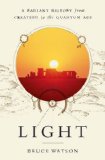Summary | Excerpt | Reviews | Beyond the Book | Readalikes | Genres & Themes | Author Bio

 Book Reviewed by:
Book Reviewed by:
Kim Kovacs
Buy This Book
Light was Jesus ("I am the light of the world.") No, it was Allah – "the Light of the heavens and the earth." No, it was the Buddha, aka Buddha of Boundless Light, Buddha of Unimpeded Light, Buddha of Unopposed Light. . . Light was inspiration — inner light. Light was love (the light in her eyes). Light was sex whose divine coupling, according to Tantric Buddhism, fills sexual organs with radiance. Light was hope, thought, salvation (seeing the light). Dante filled his Paradiso with "the heaven of pure light." Shakespeare toyed with it: "Light seeking light doth light of light beguile." The blind poet Milton was obsessed with light: "Hail, holy light, offspring of Heav'n first-born." Caravaggio and Rembrandt captured light as a sword cutting through the blackness. Vermeer sent it streaming through windows. Beethoven heard it as French horns. Haydn preferred an orchestra's full blare. Meanwhile, ordinary people spoke of the light of freedom, the light of day, the light of reason, the light of their lives. . .
Yet from the first theories about its origin, light sparked bitter disputes. The earliest philosophers quarreled about light — was it emitted by the eye or by every object? Holy men debated whether light was God incarnate or merely His messenger. And then there was light's handmaiden — color. Was it innate in each object or merely perceived by the eye? While some debated, others celebrated in festivals of light ranging from Hanukkah and winter solstice to the Hindu Diwali and the Zoroastrian Nowruz. Meanwhile, without the slightest concern for science or religion, sunrise and sunset circled the planet, rarely disappointing those who paused to admire.
Traced from creation to the quantum age, light's trajectory suggests that the miracle has lost some luster. Once we spoke of "the light fantastic," but now we find light cheap and easy, available not just in every home and office but in every palm and pocket. Artificial light once came from precious few sources — candles, lamps, and torches. But with lighting now a $100 billion industry, beams shoot out of bike helmets, keychains, shower heads, e-readers, smart phones, tablets, and dozens more devices. Light has become our most versatile tool, healing detached retinas, reading bar codes, playing DVDs. Light from liquid crystal displays brings us the Worldwide Web. Light through fiber optic cables carries the messages that girdle the planet. Thus we have made light as common as breath, as precise as a laptop.
But there was a time when light waged a heroic battle with darkness. It was a time when night skies were not bleached by urban glare, when candles were not romantic novelties, when light was the source of all warmth and safety. For the vast majority of human history, each sunrise was a celebration; each waxing moon stirred hope of nights less terrifying. And to anyone caught unprepared — in dark woods, on echoing streets, even at home when lamps flickered and failed — light was, simply, life. Unlocking its secrets required an uncommon set of keys. Curiosity. Persistence. Mirrors, prisms and lenses. Through the centuries, as civilizations took turns asking and answering, the keys passed from Greece to China to Baghdad, from Medieval France to Italy and back. When the keys came to Isaac Newton, his answers spread to the world, unlocking secrets we are still exploring.
Our evolving concepts of light chart the development of human thought, from spiritual to secular, from superstitious to scientific. So long as light was God, divinity incarnate arose each morning. Millennia passed with only a handful of curious men considering light less than holy. Then during the 1600s, the Scientific Revolution gave curiosity the upper hand. Once Kepler saw light as subject to physical laws, once Galileo showed how to gather it, once Newton broke it into color, light was no longer merely God's essence. The rhapsody was finished. Enchantment had met its midnight.
Excerpted from Light by S.J. Watson. Copyright © 2016 by S.J. Watson. Excerpted by permission of Bloomsbury USA. All rights reserved. No part of this excerpt may be reproduced or reprinted without permission in writing from the publisher.




A truly good book teaches me better than to read it...
Click Here to find out who said this, as well as discovering other famous literary quotes!
Your guide toexceptional books
BookBrowse seeks out and recommends the best in contemporary fiction and nonfiction—books that not only engage and entertain but also deepen our understanding of ourselves and the world around us.